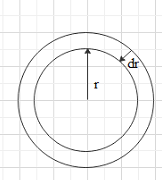Question
Question: The excess pressure inside an air bubble of radius r just below the surface of water is \({{p}_{1}}\...
The excess pressure inside an air bubble of radius r just below the surface of water is p1. The excess pressure inside a drop of the same radius just outside the surface is p2. If T is the surface tension, then:
A). p1=2p2
B). p1=p2
C). p2=2p1
D). p2=0,p1=0
Solution
Hint: For a liquid drop we have only one surface. For an air bubble we have two surfaces. Define the mathematical expression for the excess pressure inside an air bubble and inside a liquid drop using the concept of surface tension. Take their ratio to find the answer to this question.
Complete step by step answer:
Consider an air bubble of radius r and surface tension T. we have two free surfaces in an air bubble. Due to the surface tension, the molecules of the surface experience a net inward force towards the centre and normal to the surface.

Let the outside pressure is po and the inside pressure is pi .
So, the excess pressure will be p=pi−po
Due to the excess pressure inside the bubble will expand. Let the bubble expand by dr .
So, the work done by the excess pressure will be.
work done = force × displacementwork done = excess pressure × surface area × displacementwork done = p×4πr2×dr
Increase in potential energy is given by
\begin{aligned}
& =\text{ surface tension }\times \text{ increase in surface area} \\\
& =\text{ }T\times \left[ 2\left\\{ 4\pi {{\left( r+dr \right)}^{2}}-4\pi {{r}^{2}} \right\\} \right] \\\
& =T\times 2\times 4\pi \times 2rdr \\\
\end{aligned}
Comparing these two equations we get that,
p×4πr2×dr=T×2×4π×2rdrp=r4T
So, the excess pressure for an air bubble will be p1=r4T
Again, for a liquid drop we only have one free surface. Following the same procedure, we can find that the excess pressure for liquid drop is p2=r2T
Taking the ratio of these two quantities,
p2p1=r2Tr4T=2p1=2p2
The correct option is (A)
Note: While solving numerical related to this always remember that if we consider the a soap bubble or air bubble the excess pressure will be given as r4T and if we consider a liquid drop such as water drop the excess pressure will be given as r2T.
